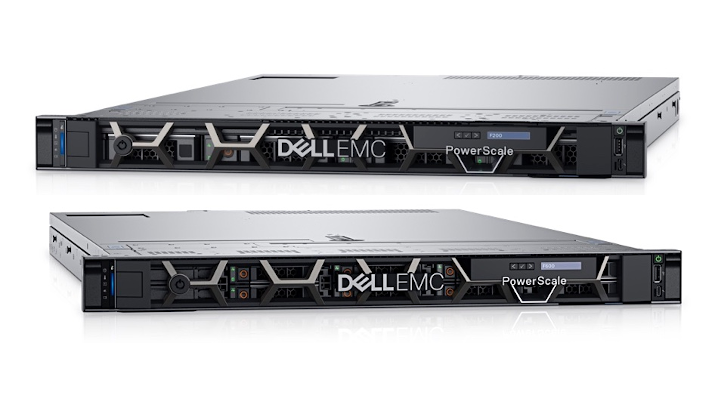 INFRA
INFRA
 INFRA
INFRA
 INFRA
INFRA
Dell Technologies Inc. said today it’s updating its Dell EMC PowerScale line of all-flash storage systems for enterprises in order to target some of the most demanding workloads around unstructured data.
The updates include the all-new Dell EMC PowerScale F900, its highest-performing all-flash storage array yet, as well as performance improvements to the existing PowerScale F200 and F600 systems. And the company also announced a new all-flash tier for the Dell EMC PowerScale for Google Cloud file service that it says will lower the barrier to entry for enterprises.
Dell EMC’s PowerScale systems debuted in June last year. They’re designed to store unstructured information that’s kept in the form of files or objects. The array family succeeded the Isilon series, which served as one of Dell’s flagship storage product lines for years. The PowerScale systems run the OneFS operating system and come with baked-in support for Kubernetes to help with the management of software containers, which are used to host the components of modern applications that can run on any computer.
In a blog post, John Shirley, Dell EMC’s vice president of product management for unstructured data solutions, said data-intensive workloads such as artificial intelligence, graphics and video, high-performance computing and electronic design automation for semiconductors require ever-growing amounts of processing power as well as the ability to scale capacity and performance.
“Data locality, performance and proven technology are top considerations for AI infrastructure,” Shirley said, citing research from Enterprise Strategy Group that shows businesses are increasing their investments in all-flash data lakes. “Unlocking the business potential in data requires file storage no longer to just be big; it must be big, fast, and simple to manage.”

To that end, Dell said it’s upping its game with the launch of the Dell EMC PowerScale F900, which boasts Intel Corp.’s powerful, dual-socket Cascade Lake processors, all NVMe flash and is compatible with Nvidia GPUDirect to handle even more data-intensive workloads.
“With this release, you get more power and scale through blazing fast all-NVMe, support for GPU accelerated applications, and the ability to easily scale up to 93 petabytes in one cluster,” Shirley explained. “Simply put, the F900 is designed to be the workhorse of modern, high-performance data lakes.”
The new system supports both on-premises and cloud workloads, Shirley said, and is also compatible with older Isilon systems.
Moor Insights & Strategy analyst Steve McDowell told SiliconANGLE that there’s a clear trend in the enterprise of data lakes migrating from traditional hard-drive based storage systems to all-flash storage, and that this is happening at a very rapid rate, and coinciding with broader adoption of analytics in the enterprise too.
“This is a space where unstructured data is the norm, and where analytics systems demand data at increasingly high levels of throughput,” McDowell said. “The F900 plays directly to this need.”
The analyst said the Dell EMC PowerEdge F900 will bring a lot of horsepower to two key analytics-focused workloads, namely deep learning and enterprise data lakes.
“GPU-accelerated deep-learning is a space where reducing latency and increasing throughput of unstructured data into AI systems is of paramount importance,” he continued. “Dell’s support for Nvidia’s GPUDirect interconnect makes this an easy product to slot into a deep learning cluster. Nvidia is the undisputed king in this space, and we’re starting to see good adoption of GPUDirect as enterprises bring purpose-built deep learning machines into the data center.”
One thing that did surprise McDowell, though, is that Dell chose not to use Intel’s latest Ice Lake CPUs in its newest all-flash storage array. Still, he said the decision to use the older Cascade Lake chips instead is unlikely to hinder the F900’s competitiveness much, and will leave room on the table for a speed bump if Dell decides to update it at a later date.
The updated PowerScale OneFS 9.2 operating system meanwhile brings some serious performance improvements to the existing PowerScale F200 and F600 systems. Dell claims that PowerScale F200 nodes get an up to 25% performance boost, while the F600 system sees its sequential reads speed increase by up to 70% for some workloads. And the introduction of remote direct memory access support for applications and clients based on network file systems enables higher throughput performance and lower-latency communication for single connection and read-intensive workloads, the company said.
McDowell said the PowerScale OneFS 9.2 update is a nice release that should provide a welcome performance increase.
“Dell has clearly tweaked its caching algorithms in the new release, as it’s delivering between 25% to 70% improvement in sequential reads across its portfolio of PowerScale products,” the analyst said. “Unstructured data tends to be read-heavy, so this will be a very welcome update for existing PowerScale customers.”
Finally, Dell introduced a new Tier 1 Agile configuration option for Dell EMC PowerScale for Google Cloud. Shirley explained that this is a new deployment option at a lower entry point with reduced minimum capacities and shorter commitment terms, for companies that want “an easy, hassle-free on-ramp” or simply to test the service.
“As the only cloud provider to offer an integrated PowerScale offering, our expanded, powerful Tier 1 configurations deliver an all-flash performance to organizations looking for shorter commitment terms that can handle demanding file workloads,” said Google Cloud General Manager of Storage Guru Pangal.
THANK YOU